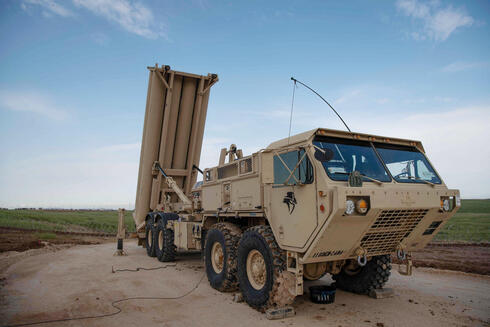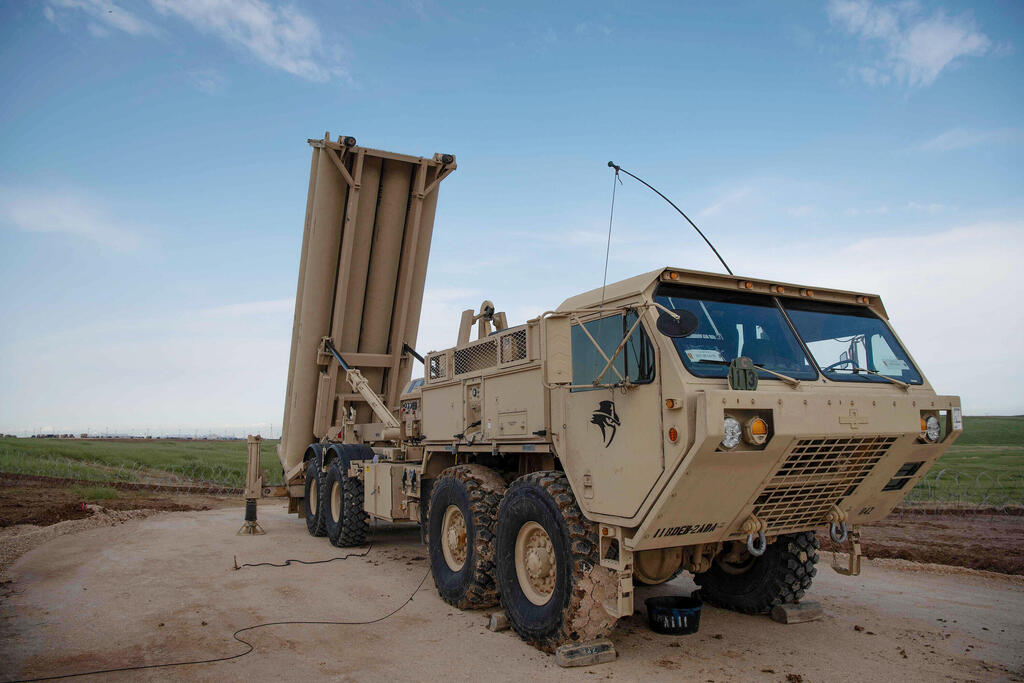
IDF faces strain as missile stocks dwindle amid continued conflict
U.S. deploys THAAD air defense to Israel as extended conflict exposes critical shortages in Israeli missile supplies.
The report in the “Financial Times”, claiming that one of the key reasons for the imminent deployment of the American THAAD air defense system in Israel is a "severe shortage of interceptor missiles," sheds new light on the IDF’s ongoing struggle with maintaining adequate armament supplies as the war extends beyond its first year. The conflict, which began over a year ago, shows no signs of ending, and the availability of various types of ammunition is becoming a growing concern.
The THAAD system, which will be operated in Israel by about 100 U.S. soldiers, is designed to integrate with the existing air defense systems, providing critical support in countering further barrages of ballistic missiles from Iran. This could prove essential if future attacks are even more intense than those launched so far. The system will be used alongside Israel Aerospace Industries’ Arrow 2 and Arrow 3 systems, which have provided the primary defense against missile attacks, such as the April and early October missile barrages, when Iran launched 185 UAVs, 110 ballistic missiles, and another 36 cruise missiles at Israel. In early October, another barrage of 181 ballistic missiles was fired at Israel, allegedly in response to the assassination of Hezbollah Secretary General Hassan Nasrallah.
Israel does not disclose its stockpile of interceptor missiles, whether Arrow or Iron Dome missiles, which are typically used for intercepting short-range rockets fired from Gaza and Lebanon. However, unlike Iron Dome missiles, which have relatively faster production times, the manufacturing of Arrow missiles is a more time-intensive process. Israel Aerospace Industries (IAI) CEO Boaz Levy referenced this in the “Financial Times”, stating that producing interceptor missiles "is not a matter of days" and acknowledged the need to replenish stocks.
In response to the report, Yair Katz, Head of the IAI Employees Union, tweeted on X to refute claims of a missile shortage. He assured that "Israel has a stockpile of interceptor missiles that can last through a long-term war across multiple arenas." He added, "I don’t know who is behind the report, but it is irresponsible at best, or an attempt to weaken Israel at worst."
Although the THAAD system does not provide interception capabilities beyond those of Israel’s Arrow 2 and Arrow 3 systems, it offers significant additional support for the air defense forces, which have been launching dozens of interceptor missiles almost daily for over a year against various missile and UAV threats.
The deployment of the U.S. THAAD battery comes as Israel prepares for potential retaliatory strikes against Iran following the recent missile barrages. Israeli systems successfully intercepted most of the Iranian missiles, although some hit key locations, including the Nevatim and Tel Nof air force bases, and populated areas in central Israel. Damage from these strikes was estimated by Israel’s Tax Authority at NIS 150 to 200 million.
The pressure on Israel’s defense industries to increase the production of interceptor missiles is likely to intensify as the conflict in Lebanon escalates, with Hezbollah launching more missiles and rockets at Israel. Despite the Israeli Air Force’s efforts to degrade Hezbollah’s missile arsenal, the organization still possesses a significant stockpile, making continued missile and rocket attacks a persistent threat.
Since the onset of the war, Israel’s defense industries have been operating in emergency mode, running production lines around the clock to supply the IDF with armaments, including interceptor missiles. However, Israeli defense companies are also obligated to meet the demands of foreign customers, who are themselves engaged in arms races, particularly in light of the ongoing war between Russia and Ukraine. This includes fulfilling contracts signed before the outbreak of war in Israel, such as producing Arrow 3 missiles for Germany as part of a NIS 14 billion defense deal—the largest in Israel’s history.
The unprecedented production demands on Israel’s defense industries are compounded by challenges in sourcing raw materials from abroad. The increasing reluctance of international suppliers, particularly in Europe, to provide essential materials, including specialized metals and electronic components, is further straining production capabilities. In response, Israeli defense companies have had to find local solutions. For example, IAI recently opened a new factory in the town of Ofakim to manufacture components previously imported from abroad, though such efforts come at great cost in both time and money.
The war that erupted on October 7 in southern Israel has shifted focus to the northern sector in recent weeks, with the constant concern of a broader conflict involving Iran looming in the background. This marks the longest continuous campaign in Israel’s history, challenging the country’s traditional security doctrine, which assumed any military campaign would be short and decisive, lasting no more than a month.
This shift has significant implications for how the IDF manages its ammunition stockpiles. The IDF has historically maintained reserves sufficient for short, intense conflicts, but a prolonged war with no clear end in sight is straining these reserves. As the need for interceptor missiles and other armaments grows, so too does the pressure on Israel’s defense industries to keep pace with the demands of war while navigating complex international supply chain challenges.















